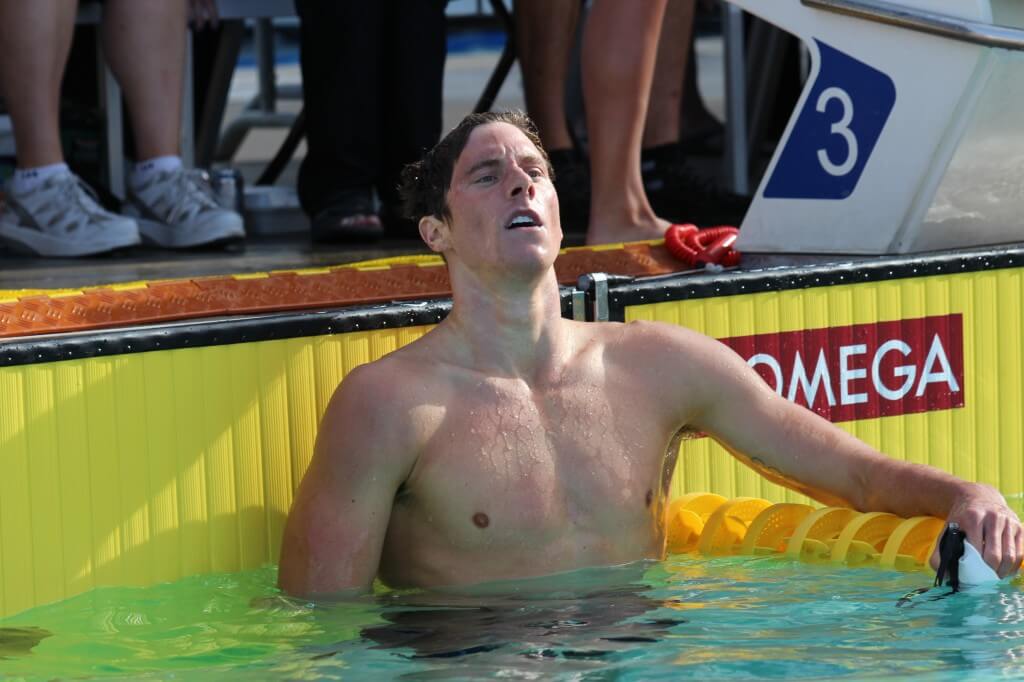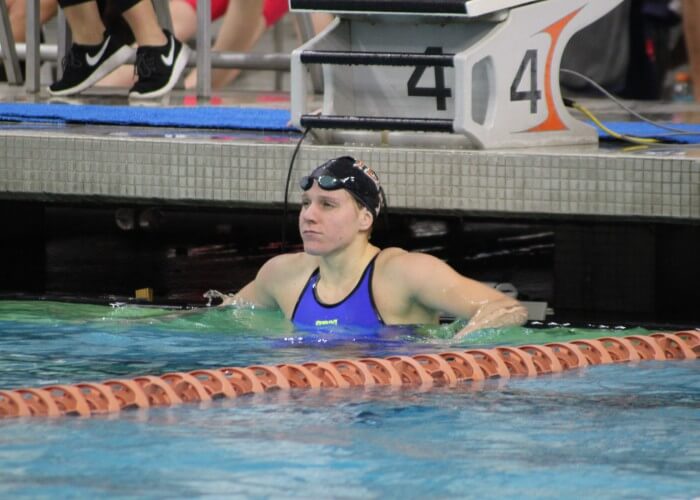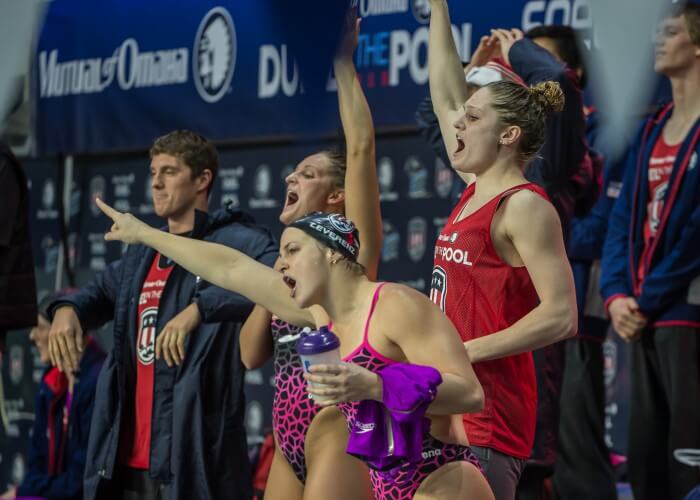Escaping Your Fear of the Bad Race

By Julia Cunningham, Swimming World College Intern
Bouncing back only gets harder the longer you wait to do it. With championship season fast approaching, those tiny shreds of doubt are constantly lingering in the back of your mind.
What if I don’t hit my taper? What if I let my team down? What if I choke? What if I’m a disappointment? You are never totally free of the potentially Bad Race. Sometimes the pressure gets to your head. Sometimes that one wrong turn in the middle of your race ends the meet for you right at that moment.
Even the greats have have had their not-so-great moments. Michael Phelps’ most recent drunk driving stint took him off of the FINA World Championship team. And yet, he’s back— better, faster, and stronger than ever. Missy Franklin took the world by storm after winning two individual golds in London in 2012. Three years later, in Kazan at the World Championships, she came in second in the 200 back and didn’t medal in the 100 back, both with times that were nowhere near her Olympic times. Both Phelps and Franklin remain the best in the world when they are not at their best. Even at their level, however, not every meet goes exactly how they planned.
The Bad Race
It’s hard, sometimes, to separate what you can and can’t control when it comes down to racing. For college sophomore Madison Carroll, her best event turned into her worst nightmare when she got DQed her junior year of high school.
“I flinched on my start, and to add insult to injury, added a second,” she said. “I remember feeling complete devastation, like all the double practices and dedication I had put into that season were for nothing. I felt like I had failed everyone, and that my stupid mistake, that tiny little flinch, invalidated my place on the team and in the sport.”
That season, there was a new coach and high expectations. “The season before, my sophomore year, I swam really well without going to doubles much, and I was excited to see what would happen when I pushed myself even further,” Carroll recalled. When it came down to that one event, everything should have culminated into the perfect race.
Right?
“I don’t remember much about what lead up to that race. I remember swimming well in my earlier event, the 200 IM, so I think my head was in an okay place, despite the inevitable nerves,” Carroll said. “I do remember the whole thing feeling not quite right, and just being absolutely crushed when I looked up at the scoreboard.”
Is it that we care too much? Are we too busy comparing ourselves to others rather than competing with our own times? My freshman year of high school was a psychological drain. My entire season felt like Carroll’s one bad race. I wasn’t anywhere near my best times and my strokes all felt wrong. I spent hours with my coach talking about technique, going over drills, analyzing mindset. We put so much into this sport, why can’t it just reward us every time we swim?
Keep Your Head Up
Carroll realized she had to keep moving forward. “I think that I approach a lot of things about swimming differently since that day. Bad races still happen all the time. It’s a reality of the sport. Now, I think a lot more about the details of my races, and I think that I’ve learned not to put as much pressure on myself especially for a single race.”
One thing that we tend to forget is how much of a team sport swimming is. Your bad races don’t just affect you. Coaches feel the disappointment just as much as the swimmer, sometimes two-, three-, ten-fold depending on the type of meet their team is having. Your teammates can usually see how you’re feeling about your races written all over your face.
“I had to suck it up and remember that my one race was not as important as my team,” Carroll said. “It would not be fair for me to push my disappointment on my teammates. No one can have perfect races all the time, and of course you’re allowed to be upset about a race that didn’t go how you wanted it to, but you have to be able to pull it together because negativity spreads quickly.”
While it is a lot easier to cry in a corner, it is not, as I have learned, an effective morale booster. Sometimes, putting a smile on and supporting teammates who may be having a great meet helps get going for that next race.
Often, time is not even the most important factor at meets. Working on technique, trying out a new race strategy or even just going to a meet to have fun are all reasons why we compete. “I also have gotten a lot better about recognizing that my teammates and coaches don’t really care about my times,” Carroll said. “At the end of the day, they care more about me and how I feel. They are there to help me fix what I need to in order to become better.”
Address the Issue Head On
Setbacks happen. On Friday, Cathleen Pruden pointed out that we all just need to get better at failing. “If you look at the way you take and handle setbacks as a skill, something you can actively work on, than you are light years ahead of those swimmers that take every failure – large and small – as an indictment on their abilities.”
How can we learn to take that step back and look critically at our race rather than stewing on it for the rest of the meet, the rest of the season, the rest of our careers?
Junior Zoe Kurtz from Vassar College explained that she often needs to remind herself why she swims. “I had a lot of bad races last season, and it wasn’t because I wasn’t working hard or because I didn’t care about the results. It’s because I was letting the pressure I was feeling in school really get to my head,” she said. “I wasn’t feeling comfortable with where I was in school, and that feeling translated to all parts of my life. I for some reason could not just simply enjoy what I was able to do, which was swim.”
In college, the decision to be an athlete lies entirely on you. There no longer is pressure from parents to follow the plan they laid out for you before they took you home for the first time, or obligations to hang out with friends on sports teams. We wouldn’t be choosing the constant training or the early hours or the constant, clinging scent of chlorine if it weren’t for the love of the sport.
After last season, Kurtz approached this season with a fresh attitude. “I took away a greater appreciation for what we get to do,” she said. “Once I settled down in school, I started to have a more positive outlook on all parts of my life. And once this season began, I knew that I was not going to have that season again.”
It wasn’t all about the training. “I didn’t have to work any harder or put in more time,” she said, “All I needed to do was to be able to enjoy the moment I was in when I was swimming and leave everything else at the door. I stopped doubting myself and allowed myself to have fun.”






Brittany Archer